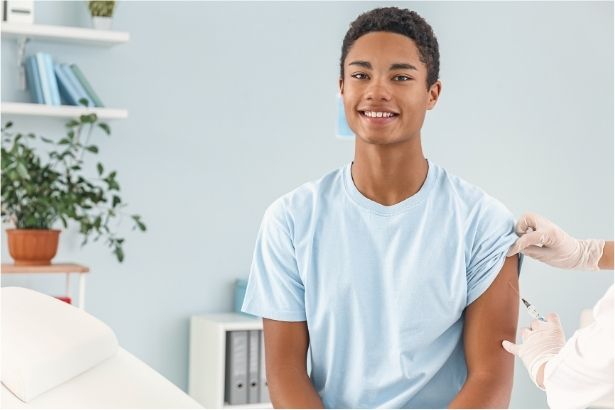Understanding HPV Vaccines: Shielding Against a Common Threat
Human Papillomavirus (HPV) is a common sexually transmitted infection that can affect both men and women. In this article, we aim to provide valuable information about HPV, including its symptoms, available treatments, and preventive measures.

What is HPV?
HPV is a group of related viruses that can infect various parts of the body, including the genital area, mouth, and throat. According to the Centers for Disease Control and Prevention, while some types of HPV can cause warts on the skin, others are known to cause cancer. It is primarily spread through intimate skin-to-skin contact.
According to the Children’s Hospital of Philadelphia (CHOP). HPV is one of the most common sexually transmitted diseases among both men and women in the United States, with about 42.5 million Americans being infected with HPV.
The Importance of HPV Vaccines
According to the World Health Organization, regular screenings and vaccinations are essential for early detection and prevention. Vaccines are designed to protect against the most common types of the virus that can lead to cancers and warts. Vaccination is recommended for both girls and boys and is most effective when administered before any sexual activity begins.
Symptoms of HPV and the Role of Vaccination
1. Genital Warts: HPV can lead to the development of genital warts, which are not only a physical concern but can also cause emotional distress. Vaccination provides a powerful defense against the HPV types responsible for these warts.
2. Cancer Prevention: High-risk HPV types are associated with various cancers, including cervical, anal, penile, and oropharyngeal cancers. Vaccination significantly reduces the risk of developing these cancers by targeting the specific viral strains responsible. More specifically, HPV causes cervical cancer, one of the most common cancers in women. According to CHOP, each year, approximately 13,000 American women get cervical cancer and about 4,000 women die from the disease.
“The HPV vaccine was approved for use in 2006 for females only. By 2011 the United States decided that the benefits of the vaccine could be applied to both male and female patients,” explained Sonia Tavaska, MSN, APRN, WHNP-BC of Brevard Health Alliance’s Sarno clinic. “The American Cancer Society recommends a primary HPV test as the preferred way to screen for cervical cancers or pre-cancers in individuals 25 to 65 years.”
Effectiveness of HPV Vaccines
HPV vaccines have demonstrated high effectiveness in preventing HPV-related diseases. Clinical studies have shown that the vaccines are highly protective against the targeted HPV types, providing long-lasting immunity. It’s important to note that vaccination is most effective when administered to boys and girls at the recommended age, typically starting at 11 or 12 years old.
“The HPV vaccine can be started as early as nine years old. Parents are encouraged to speak with their Pediatric provider about the vaccine. There are currently two manufacturers of the vaccine. One vaccine is provided in a two-step process the other is a three-step process. After the first dose the next dose for the two-step process is in 6-12 months. For the three-step vaccine a dose is provided 1-2 months after the first dose, and then again at 6 months.”
Preventative Measures: Getting Vaccinated
1. Vaccination Schedule: The CDC recommends routine HPV vaccination for all preteens aged 11 or 12, with a catch-up vaccination for those not vaccinated during this age range. The vaccine is administered in two or three doses, depending on the age at the first dose.
2. Vaccination for Everyone: HPV vaccination is not only for girls and young women. Boys and young men can benefit significantly from vaccination, protecting against cancers and reducing the transmission of the virus.
“Males are not immune from the effects of HPV,” stressed Tavaska. “They can also get cancers of the genital area, and of the head and neck.”
3. Catch-Up Vaccination: Even if someone has already been exposed to one or more HPV types, vaccination can still be beneficial as it may protect against other types not yet encountered.
4. Talk to Your Healthcare Provider: If you have questions or concerns about HPV vaccination, consult your healthcare provider. They can provide personalized advice and address any specific health considerations.
“Your provider will be able to discuss evidence-based information on the effectiveness of the HPV vaccine,” says Tavaska.
Additional Preventative Measures
While getting the HPV vaccine is the best way to reduce your chance of getting infected, there are additional measures our providers recommend patients take.
1. Safe Sex Practices: Consistent and correct use of condoms during sexual activity can reduce the risk of HPV transmission. However, it is essential to note that condoms may not cover all potentially infected areas of the body.
2. Regular Screenings: Routine screenings, such as Pap smears for cervical cancer, are crucial for early detection and intervention. Early identification of abnormal cell changes can prevent the progression to cancer.
“The American Cancer Society supports screening for cervical cancer by Pap smear starting at the age of 21 and every 3 years after as long as the patient does not have an abnormal pap smear. The older a patient gets the timing for Paps may increase, but that is something to review with your provider. After a Pap smear is done it can take up to 10 days to get a result back.”
3. Education and Awareness: Understanding the risks associated with HPV and promoting awareness can empower individuals to make informed decisions about their sexual health. Resources from organizations like the American Cancer Society support comprehensive educational initiatives, fostering a more informed and proactive community.
HPV vaccines are powerful tools in preventing HPV-related diseases, including cancers and genital warts. By understanding the importance of vaccination, following the recommended schedule, and consulting with healthcare providers, individuals can take proactive steps to protect their health. If you have concerns about HPV or wish to learn more, consult with your healthcare provider. Remember, knowledge and prevention are powerful tools in the fight against HPV.

Sonia Tavaska is an Advanced Practice Registered nurse specializing in women’s health, obstetrics, and gynecology. Sonia support BHA’s mission to provide quality care to the women in our community.


















































































































































